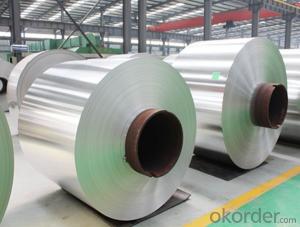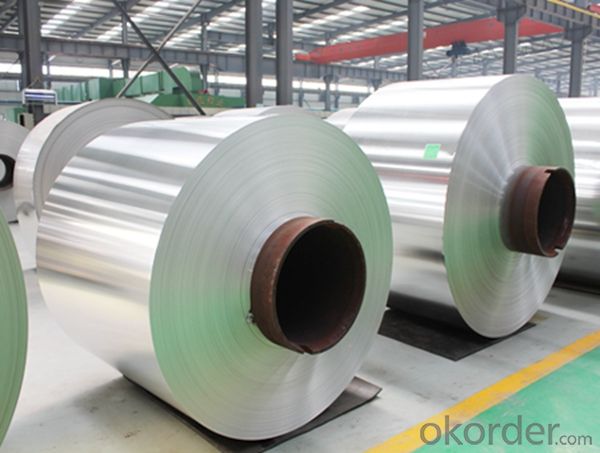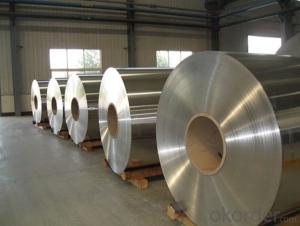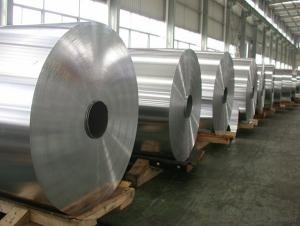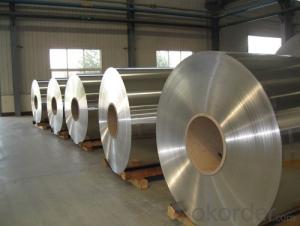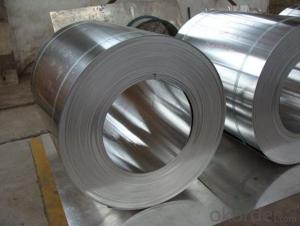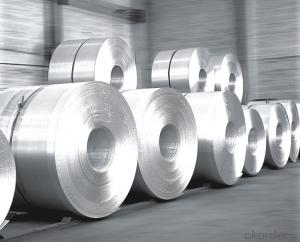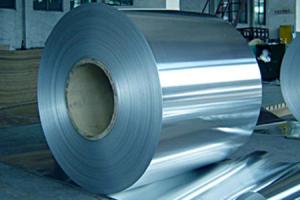Mill Finish Aluminum 1050 1060 Coil Racks - China Factory Direct Supply
- Loading Port:
- Shanghai
- Payment Terms:
- TT OR LC
- Min Order Qty:
- 5 m.t.
- Supply Capability:
- 1000 m.t./month
OKorder Service Pledge
OKorder Financial Service
You Might Also Like
Specification
1. Specification of Mill Finish Aluminum 1050 1060 China Factory Direct Supply
Alloy Number | AA5XXX 1XXX 3XXX |
Temper | H12, H14, H16, H18, H22, H24, H26, H32, HO, F |
Thickness | 0.1mm – 500mm |
Width | 10mm- 2200mm |
Standard | GB/T3880-2006, ASTM, ISO, EU standard |
2. Application of Mill Finish Aluminum 1050 1060 China Factory Direct Supply
(1).Interior: wall cladding, ceilings, bathrooms, kitchens and balconies, shutters, doors...
(2).Exterior: wall cladding, facades, roofing, canopies, tunnels,column covers , renovations...
(3).Advertisement: display platforms, signboards, fascia, shop fronts...
3. Feature of Mill Finish Aluminum 1050 1060 China Factory Direct Supply
Surfact Quality :
Be free from Oil Stain, Dent, Inclusion, Scratches, Stain, Oxide Dicoloration, Breaks, Corrosion, Roll Marks, Dirt Streaks and other defect which will interfere with use,
Mechenical Property:
Chemical Composite and Mechanical Property
4. Certificate:
SGS and ROHS(if client request, paid by client), MTC(plant provided), Certificate of Origin(FORM A, FORM E, CO), Bureau Veritas and SGS (if client request, paid by client), CIQS certificate
5. Image of Mill Finish Aluminum 1050 1060 China Factory Direct Supply
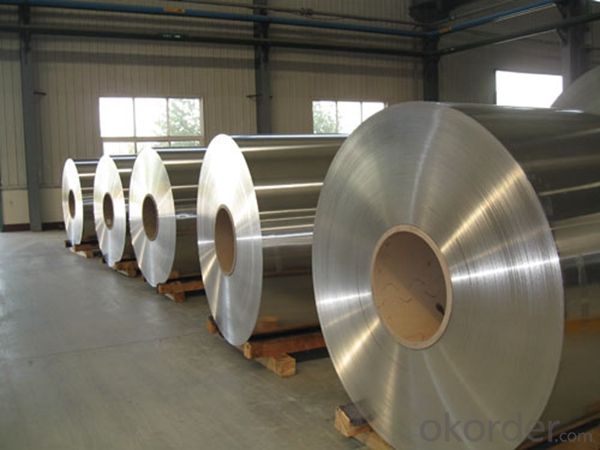
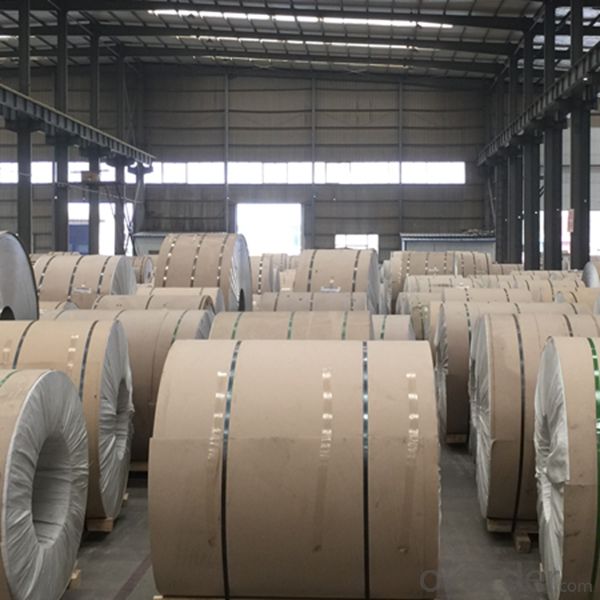
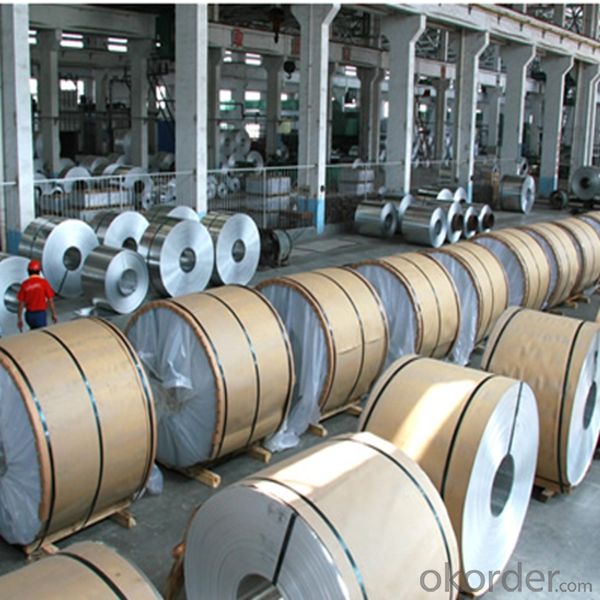
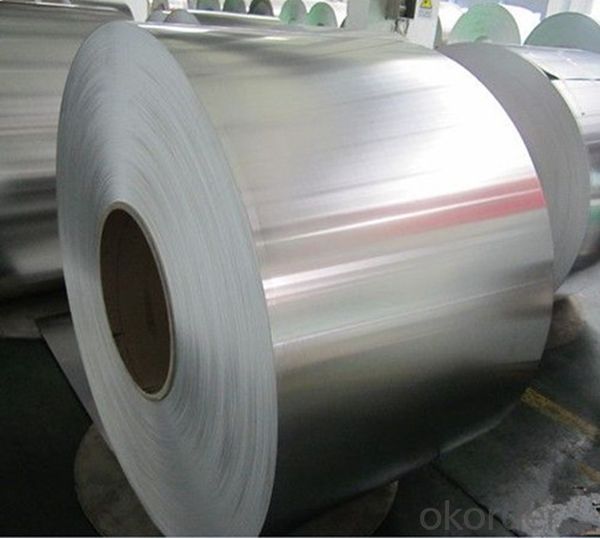
6. Package and shipping of Mill Finish Aluminum 1050 1060 China Factory Direct Supply
First, plastic cloth with drying agent inside; Second, Pearl Wool ; Third, wooden cases with dry agent , fumigation wooden pallets, aluminum surface could cover blue PVC film
7. FAQ
1) What is the delivery time?
Dpends on actual order, around 20 to 35 days
2)What is the QC system:
We have QC staff of 20 persons and advanced equipment, each production is with MTC traced from Aluminum ingot lot.
3) What market do you mainly sell to?
Australia, America, Asia, Middle East, Western Europe, Africa etc
- Q: This question asks for methods to prevent rust formation on aluminum coils during indoor storage.
- <p>To prevent rust on aluminum coils when storing them indoors, ensure that the storage area is clean and dry. Keep the coils away from moisture and humidity, as these can cause oxidation. Use protective wrapping or coverings to shield the coils from dust and airborne moisture. Regularly inspect the coils for any signs of condensation or dampness and address these promptly. Maintain proper ventilation in the storage area to reduce humidity levels. Additionally, avoid stacking the coils directly on the ground; use pallets or racks to elevate them, which helps in air circulation and prevents contact with moisture that could be present on the floor.</p>
- Q: why is aluminum to the right side of the periodic table if it's a metal and why is it negatively charge if it's a mental. also if you combine it with like another metal will it be an ion since its positively charge or no because they are both metals
- Aluminum is not placed with the other metals such as transition metals or alkali metals because it is classified as a poor metal. Elemental aluminum, in it's pure form, is not an ion because it has no charge. If combined with another metal, the result will also be neutral if the metal aluminum was being combined with was neutral. Hydrogen won't have the same case because it is not a metal, it is a gas. The only reason it is in the same column as metals is because they all have 1 valence electron
- Q: What are the different tensile strengths of aluminum coils?
- The tensile strength of aluminum coils may differ based on the particular alloy and temper of the aluminum employed. Aluminum alloys, which are frequently used for coils, encompass 1100, 3003, 5052, and 6061. The tensile strength of these alloys can span from roughly 13,000 psi (90 MPa) for 1100 aluminum to approximately 45,000 psi (310 MPa) for 6061 aluminum. The temper of the aluminum also assumes a significant role in establishing its tensile strength. The prevailing temper for aluminum coils is H14, signifying that the material has undergone strain-hardening and partial annealing to attain a balance of strength and formability. Different tempers like H18, H24, and H32 can lead to higher tensile strengths, whereas softer tempers such as O (annealed) or H12 can result in lower tensile strengths. It is essential to acknowledge that these values are general ranges and may marginally deviate depending on the specific manufacturer and production process. Furthermore, factors like thickness, width, and surface treatment of the aluminum coils can also exert influence on their tensile strength. Consequently, it is advisable to refer to the manufacturer's specifications or conduct testing on the specific aluminum coil to accurately ascertain its tensile strength.
- Q: Can aluminum coils be used in refrigeration systems?
- Yes, aluminum coils can be used in refrigeration systems. Aluminum is a common material choice for evaporator coils in refrigeration systems due to its excellent heat transfer properties, corrosion resistance, and lightweight nature.
- Q: Who knows Xingtai aluminum shutter door how much is one square meter?
- Aluminum alloy rolling doors more than 10 specifications, prices are not the same, depending on the sample to know the price, the price range is probably between 100--800, a great difference between Oh!
- Q: What is the typical thermal conductivity of aluminum coils?
- The typical thermal conductivity of aluminum coils is around 205-230 W/mK.
- Q: What is the balanced chemical equation for aluminum and cobalt?That is all the information that the question gives. If you could help me out, I would really, really appreciate it.
- That's pretty sparse. Perhaps the question is referring to a single replacement reaction. Aluminum is above cobalt in the activity series, which allows us to predict that aluminum metal will reduce cobalt ions, while aluminum is oxidized. This occurs as long as there is an ion present which will react with the aluminum oxide layer on the surface of aluminum. This passivating Al2O3 layer keeps aluminum metal from reacting. The presence of chloride ions will break down the passivating layer allowing the aluminum metal below to react. Al2O3(s) + 6H+ + 8Cl- -- 2[AlCl4]- + 3H2O(l) 2Al(s) + 3Co2+ -- 2Al3+ + 3Co(s)
- Q: What are the different coil slitting methods for aluminum coils?
- There are various coil slitting methods employed for aluminum coils, each with its own advantages and suitability for different applications. Some of the common coil slitting methods for aluminum coils include: 1. Rotary Shear Slitting: This method involves the use of a rotating knife or shear blade to cut the aluminum coil into narrow strips. Rotary shear slitting is suitable for high-speed production lines and offers excellent accuracy and clean edges. 2. Looping Slit: In this method, the aluminum coil is looped and fed through a set of rotating circular blades. The blades cut the coil into desired widths, ensuring precise cuts. Looping slit is commonly used for thin aluminum coils and offers good accuracy and productivity. 3. Double Knife Slitting: Also known as duplex slitting, this method involves the use of two circular knives positioned on top and bottom of the aluminum coil. The knives move in opposite directions, cutting the coil into multiple strips simultaneously. Double knife slitting is suitable for high-volume production and provides excellent accuracy and efficiency. 4. Razor Slitting: This method utilizes razor-sharp blades mounted on a rotating shaft to cut the aluminum coil. Razor slitting is particularly suitable for thinner gauge coils and provides clean, burr-free edges. 5. Crush Slitting: Crush slitting involves compressing the aluminum coil between two rotating rolls with sharp edges. The pressure exerted by the rolls cuts the coil into desired widths. Crush slitting is commonly used for thicker gauge coils and offers good productivity and edge quality. 6. Laser Slitting: Laser slitting employs a high-powered laser beam to cut the aluminum coil. This method offers exceptional precision and accuracy, making it ideal for intricate and complex cutting requirements. The choice of coil slitting method depends on various factors such as coil thickness, desired strip widths, production volume, and edge quality requirements. Each method has its own advantages and limitations, so it is essential to evaluate these factors to select the most appropriate coil slitting method for a specific application.
- Q: Are there any limitations to the maximum coil length of aluminum coils?
- The maximum length of aluminum coils is subject to certain limitations. Factors that affect the maximum coil length include the thickness and width of the coil, the strength and tensile properties of the aluminum alloy, the equipment used for coil processing, and the intended application of the coil. One limitation is the strength and ductility of the aluminum alloy. Aluminum alloys with higher strength and lower ductility may have restrictions on the maximum coil length due to the risk of coil breakage or deformation during processing or handling. Another limitation is the coil processing equipment. The maximum coil length is often determined by the size and capabilities of the equipment used for slitting, cutting, or forming the coils. If the equipment has limited capacity or is not designed for longer coils, it may not be able to effectively handle or process longer lengths. The intended application of the coil can also impose limitations. For example, in the automotive industry, there may be restrictions on the maximum coil length based on the size and weight limitations of the vehicles. Moreover, logistical factors such as transportation and storage can also impose limitations. Longer coils may be more challenging to handle, transport, and store, which can increase the risk of damage or pose challenges in terms of logistics and space requirements. Therefore, it is crucial to consider various factors such as alloy properties, equipment capabilities, application requirements, and logistical considerations to determine the practical limitations of coil length for a specific situation, as there is no specific universal limit to the maximum coil length of aluminum coils.
- Q: Can aluminum coils be customized?
- Indeed, it is possible to customize aluminum coils to meet specific requirements. These coils possess remarkable versatility, as they can be tailored in terms of thickness, width, length, alloy composition, surface finish, and other specifications. Consequently, they find extensive utility across diverse industries, including construction, automotive, aerospace, electronics, and packaging. The customization of aluminum coils involves various processes, such as slitting, cutting-to-length, embossing, painting, and coating. This remarkable flexibility in customization empowers manufacturers to satisfy the distinct demands of their clientele, thereby ensuring that the aluminum coils are perfectly optimized for their intended applications.
Send your message to us
Mill Finish Aluminum 1050 1060 Coil Racks - China Factory Direct Supply
- Loading Port:
- Shanghai
- Payment Terms:
- TT OR LC
- Min Order Qty:
- 5 m.t.
- Supply Capability:
- 1000 m.t./month
OKorder Service Pledge
OKorder Financial Service
Similar products
Hot products
Hot Searches
Related keywords
